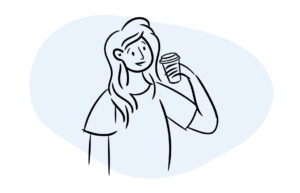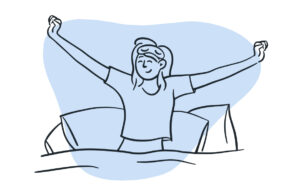The Truth About Chronotypes, According to a Sleep Expert
Disclosure: By clicking on the product links in this article, Mattress Nerd may receive a commission fee at no cost to you, the reader. Read full disclosure statement.
Mattress Nerd consulted Dr. Heidi Moawad to ensure that this article met our editorial standards.
The pursuit of the perfect night’s sleep can lead to some interesting techniques. From herbal supplements to rigid schedules, people will try almost anything to sleep better.
Dr. Michael Breus created a system that identifies sleepers as different animals (bears, wolves, lions, and dolphins) according to their body’s inclination to sleep at certain times. This system of chronotypes is designed to help folks understand and leverage their natural tendencies, but does it really work?
We spoke with sleep psychologist Dr. Jade Wu to find out what the science says about chronotypes and how to figure out yours and use it to improve your quality of life, sleep, and productivity.
Bottom Line: What are Chronotypes?
Your chronotype is determined by the time your body naturally wants to be awake and be asleep. There are two large categories, called early chronotypes and late chronotypes, but it is a spectrum of identities. If you know roughly where you fall on that spectrum, there are ways to improve your lifestyle by living more in line with your body’s needs.
Chronotypes: The Basics
A chronotype is your tendency or predisposition to want to go to sleep and wake at a certain time. This means that your body has a time that it wants to wake up every morning and go to sleep every night.
Dr. Wu explains that, according to sleep science, there are two major categories of chronotypes: early chronotype and late chronotype. Instead of many distinct types of chronotypes in between, she says there’s more of a spectrum between the two.
This means that you could be a very strong early chronotype and resonate with every detail strongly. It also means that you could be a mild early chronotype, where you don’t experience the tendency with severity.
Early Chronotype
Who are Early Chronotypes?
Early chronotypes are the early birds, and the good news for this group is that society is built around them and their waking hours. These are the people who feel great getting up early and love morning time.
Energy and productivity levels are normally higher for the early chronotypes in the mornings. This tends to result in them being sleepy in the afternoon and ready for bed earlier in the evening.
You’re probably familiar with the saying, “early bird gets the worm.” These early chronotypes get their work done earlier in the day, “getting the worm” before the late chronotypes.
If you’ve taken one of the online quizzes and got “the bear,” you’re an early chronotype. Someone with this type will tend to be most productive before noon, facing a decline of energy for the rest of the day.
What’s the Best Schedule for Early Chronotypes?
As society’s schedule works around the waking and sleeping hours of the early chronotype, it is easy to operate daily. However, there are a few improvements you could implement to ensure you are listening to your body’s needs and wants.
Schedule Your Important Tasks in the Morning
Based on your high energy and productivity in the mornings, you want to put your important tasks in the morning times. For example, if you want to work out three times a week, plan to do so on the mornings of Monday, Wednesday, and Friday. You are more likely to accomplish this goal with your high energy and good mood.
Consistent Wake-Up Time
A very important part of sleep health is having a consistent wake-up time. However, Dr. Wu wants to emphasize that just because you are a morning person, doesn’t mean you have to get up at 5 a.m. You can still be a morning person, but just a 7 a.m. morning person.
It’s important to experiment with a wake-up time until you find one that works for your routine and satisfies your body. Start by picking a time you would like to wake up. If you are consistently waking up earlier than the alarm, you may be more of a morning person than you thought. And, if you are waking up extremely groggy and exhausted, you might be a later morning person. Remember, it’s a spectrum!
Go to Sleep Early
The time you go to sleep is important as well. Since you are waking up early, you are more likely going to be tired earlier. Listen to your body and go to sleep when you feel sleepy. Of course, there will be exceptions, such as a night you want to go out with friends, and that is okay to not always follow this routine.
Late Chronotype
Who are Late Chronotypes?
Late Chronotypes are what most people call “night owls.” This group of people hate getting up early in the morning and they are definitely low energy in the morning time.
While not being morning people, they get their bursts of energy in the evening, This means that they stay up later than early chronotypes and prefer to sleep late.
As you might expect, this group is very common among teenagers. Research suggests that late chronotypes peak at age 19, meaning this age group is staying up later and sleeping later, when able. Since society does not revolve around this chronotype, it’s hard for them to get sufficient sleep.
It is not just teenagers in this group, though. Dr. Wu says that she’s a late chronotype and has been her whole life. She’s a great example that just because society doesn’t match your waking and sleeping schedule, doesn’t mean you can’t be successful.
Based on Dr. Breus’s animal chronotype system, the late chronotype matches up to the wolf. They may tend to be most productive midday, with boosts of energy in the evening. He considers himself a “wolf” chronotype.
What’s the Best Schedule for Late Chronotypes?
Work from Home
Working from home could be an extremely beneficial lifestyle choice for late chronotypes. Dr. Wu said that she knows someone who lives on the east coast, who works for a company located on the west coast. This means that this person is able to start their day three hours later than his time, allowing him to sleep in later and get sufficient sleep.
Automate Your Morning Routine
Dr. Wu also suggests a number of hacks to streamline morning time for late chronotypes. Since this chronotype does not enjoy mornings and can be unhappy, it is important to have things automated and easy to make mornings as pleasant as possible.
She suggests laying out your clothes for the day beforehand, meal prepping lunch and dinner, and having a coffee maker on a timer. This can help reduce stress (and grumpy attitudes) in the morning.
Additionally, Dr. Wu suggests saving something enjoyable for yourself in the morning, such as sipping on your favorite cappuccino or listening to your favorite podcast. This can make it easier for you to wake up in the mornings because you have something to look forward to, incentivizing the action.
Consistent Wake-Up Time
An easily overlooked tip is to stick to the same wake-up time, and this includes weekends. Many people might try to “catch up” on sleep on the weekends by sleeping much later than their normal wake-up time. This will actually make it harder to get back to waking up early during the work week and make you more tired in the long run.
Schedule Your Important Tasks in the Afternoons
If there are any ways you can dictate your daily schedule, try and put your more important tasks in the afternoon or evening. Dr. Wu says that when she was a student in college, she never enrolled herself in a class before 10 a.m.
Putting Chronotypes Into Practice
At Mattress Nerd, we’re all about bringing you hands-on testing of the top sleep products. So when we learned about the potential power of aligning your daily life with your chronotype, we knew we needed to put it to the test. Check out how we altered our schedules and how it made us feel to live like a bear and live like a wolf for a week.
Can Your Chronotype Change?
Your chronotype can change over time, and you can actually adapt your chronotype to different schedules.
Dr. Wu says that she now has to be an early chronotype after having kids. Children are more likely to be early chronotypes, so Dr. Wu had to adjust to their schedule as a parent.
She says it is possible to change your chronotype with light and consistency. If you are a night owl who is living an early bird lifestyle, get lots of light first thing in the morning and throughout the day. This can help your melatonin curve shift earlier, forcing you to become more of a morning person even though it’s not your natural tendency.
However, it’s very easy to slip up and revert back to your old chronotype. If you go on vacation for a week and don’t follow your designated wake-up and sleeping time, you might slip back into being a night owl. It’s very important to stay consistent with this adjustment.
Why Does Knowing Your Chronotype Matter?
Dr. Wu likes to say: “Work with your body instead of against your body because life is always easier when you can listen to your biology and let your body do what it prefers.”
This means that if you are waking up and going to sleep when your body wants, chances are you and your body are going to be much happier. If you are a night owl, you might not be as unhappy when you wake up because you didn’t get enough sleep. And, if you are an early bird, you won’t be as groggy while trying to stay up too late.
Now that you may know what you are, you can take steps to improve your sleep and schedule. If you’re able to listen to when your body wants to sleep and wake, your time awake could be more productive and energized.
What do I do Now that I Know my Chronotype?
- Listen to Your Body: Your chronotype is on a spectrum and it can change. Dr. Wu says that your chronotype can depend on the season, length of daylight, menstrual cycle for women, and even your latitude on the Earth. Many factors can affect your sleep biology, and it is important to trust your body.
- Start with Small Changes: It takes 30 days for something to become a habit, and if you are trying to change your whole life instantly it’s not likely to stick. Start off with small changes you can make to follow the sleeping and waking times your body wants.
Source List
- Kalmbach, DA. (2017). Genetic Basis of Chronotype in Humans: Insights From Three Landmark GWAS. https://pubmed.ncbi.nlm.nih.gov/28364486/
- Wu, J. (2023). Personal interview.


